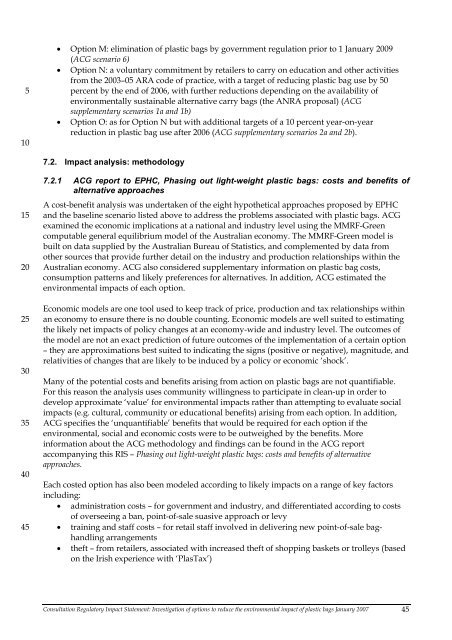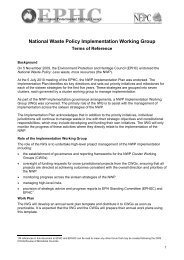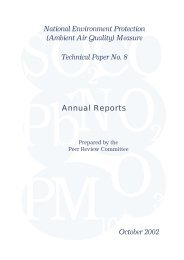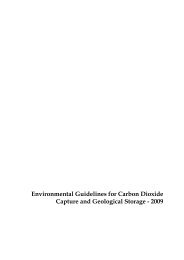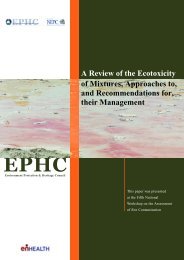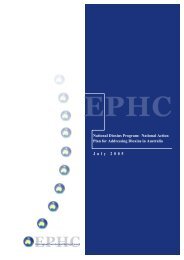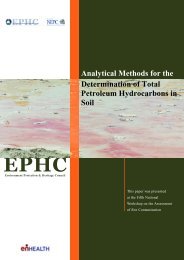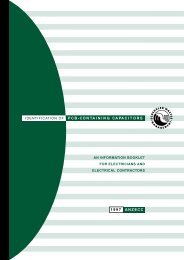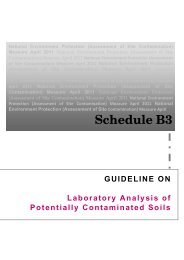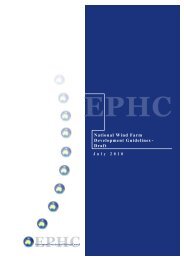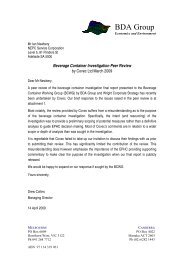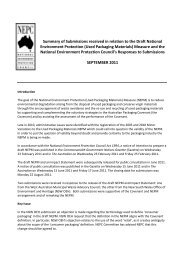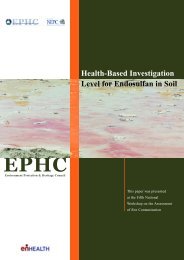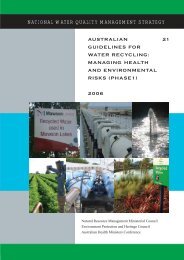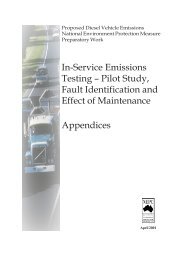Plastic Bags - COAG Standing Council on Environment and Water
Plastic Bags - COAG Standing Council on Environment and Water
Plastic Bags - COAG Standing Council on Environment and Water
Create successful ePaper yourself
Turn your PDF publications into a flip-book with our unique Google optimized e-Paper software.
5<br />
10<br />
• Opti<strong>on</strong> M: eliminati<strong>on</strong> of plastic bags by government regulati<strong>on</strong> prior to 1 January 2009<br />
(ACG scenario 6)<br />
• Opti<strong>on</strong> N: a voluntary commitment by retailers to carry <strong>on</strong> educati<strong>on</strong> <strong>and</strong> other activities<br />
from the 2003–05 ARA code of practice, with a target of reducing plastic bag use by 50<br />
percent by the end of 2006, with further reducti<strong>on</strong>s depending <strong>on</strong> the availability of<br />
envir<strong>on</strong>mentally sustainable alternative carry bags (the ANRA proposal) (ACG<br />
supplementary scenarios 1a <strong>and</strong> 1b)<br />
• Opti<strong>on</strong> O: as for Opti<strong>on</strong> N but with additi<strong>on</strong>al targets of a 10 percent year-<strong>on</strong>-year<br />
reducti<strong>on</strong> in plastic bag use after 2006 (ACG supplementary scenarios 2a <strong>and</strong> 2b).<br />
7.2. Impact analysis: methodology<br />
15<br />
20<br />
25<br />
30<br />
35<br />
40<br />
45<br />
7.2.1 ACG report to EPHC, Phasing out light-weight plastic bags: costs <strong>and</strong> benefits of<br />
alternative approaches<br />
A cost-benefit analysis was undertaken of the eight hypothetical approaches proposed by EPHC<br />
<strong>and</strong> the baseline scenario listed above to address the problems associated with plastic bags. ACG<br />
examined the ec<strong>on</strong>omic implicati<strong>on</strong>s at a nati<strong>on</strong>al <strong>and</strong> industry level using the MMRF-Green<br />
computable general equilibrium model of the Australian ec<strong>on</strong>omy. The MMRF-Green model is<br />
built <strong>on</strong> data supplied by the Australian Bureau of Statistics, <strong>and</strong> complemented by data from<br />
other sources that provide further detail <strong>on</strong> the industry <strong>and</strong> producti<strong>on</strong> relati<strong>on</strong>ships within the<br />
Australian ec<strong>on</strong>omy. ACG also c<strong>on</strong>sidered supplementary informati<strong>on</strong> <strong>on</strong> plastic bag costs,<br />
c<strong>on</strong>sumpti<strong>on</strong> patterns <strong>and</strong> likely preferences for alternatives. In additi<strong>on</strong>, ACG estimated the<br />
envir<strong>on</strong>mental impacts of each opti<strong>on</strong>.<br />
Ec<strong>on</strong>omic models are <strong>on</strong>e tool used to keep track of price, producti<strong>on</strong> <strong>and</strong> tax relati<strong>on</strong>ships within<br />
an ec<strong>on</strong>omy to ensure there is no double counting. Ec<strong>on</strong>omic models are well suited to estimating<br />
the likely net impacts of policy changes at an ec<strong>on</strong>omy-wide <strong>and</strong> industry level. The outcomes of<br />
the model are not an exact predicti<strong>on</strong> of future outcomes of the implementati<strong>on</strong> of a certain opti<strong>on</strong><br />
– they are approximati<strong>on</strong>s best suited to indicating the signs (positive or negative), magnitude, <strong>and</strong><br />
relativities of changes that are likely to be induced by a policy or ec<strong>on</strong>omic ‘shock’.<br />
Many of the potential costs <strong>and</strong> benefits arising from acti<strong>on</strong> <strong>on</strong> plastic bags are not quantifiable.<br />
For this reas<strong>on</strong> the analysis uses community willingness to participate in clean-up in order to<br />
develop approximate ‘value’ for envir<strong>on</strong>mental impacts rather than attempting to evaluate social<br />
impacts (e.g. cultural, community or educati<strong>on</strong>al benefits) arising from each opti<strong>on</strong>. In additi<strong>on</strong>,<br />
ACG specifies the ‘unquantifiable’ benefits that would be required for each opti<strong>on</strong> if the<br />
envir<strong>on</strong>mental, social <strong>and</strong> ec<strong>on</strong>omic costs were to be outweighed by the benefits. More<br />
informati<strong>on</strong> about the ACG methodology <strong>and</strong> findings can be found in the ACG report<br />
accompanying this RIS – Phasing out light-weight plastic bags: costs <strong>and</strong> benefits of alternative<br />
approaches.<br />
Each costed opti<strong>on</strong> has also been modeled according to likely impacts <strong>on</strong> a range of key factors<br />
including:<br />
• administrati<strong>on</strong> costs – for government <strong>and</strong> industry, <strong>and</strong> differentiated according to costs<br />
of overseeing a ban, point-of-sale suasive approach or levy<br />
• training <strong>and</strong> staff costs – for retail staff involved in delivering new point-of-sale bagh<strong>and</strong>ling<br />
arrangements<br />
• theft – from retailers, associated with increased theft of shopping baskets or trolleys (based<br />
<strong>on</strong> the Irish experience with ‘PlasTax’)<br />
C<strong>on</strong>sultati<strong>on</strong> Regulatory Impact Statement: Investigati<strong>on</strong> of opti<strong>on</strong>s to reduce the envir<strong>on</strong>mental impact of plastic bags January 2007 45


